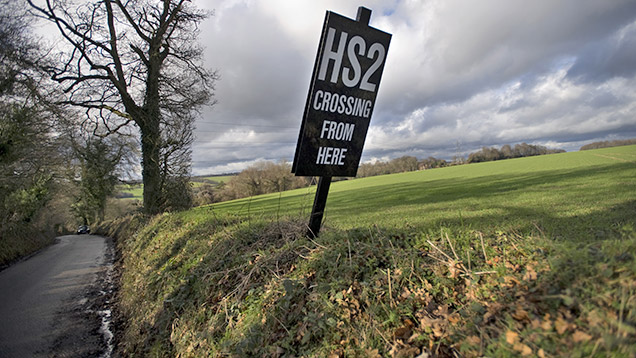Housing Bill ignores farmers’ compulsory purchase problems
 HS2 high-speed rail link
HS2 high-speed rail link The government has failed to tackle some major problems with the compulsory purchase system in its new Housing and Planning Bill, according to the Country Land and Business Association.
The Bill, which aims to increase the supply of housing and extend the right to buy so more people can become homeowners, had its first reading in the House of Commons on 13 October 2015.
Andrew Shirley, CLA chief surveyor, said the biggest win for farmers was that they would be able to apply for compensation as soon as a compulsory purchase scheme had been approved.
“This is a very good win and quite exciting,” he said. “It means if you are losing buildings you can put in a claim straight away, so you can replace those buildings. It is important, since if you are losing, for example, a silage camp in the spring, you would need a replacement silage clamp the year in advance.”
See also: Farmers’ HS2 concerns ‘still not being heard’
But Mr Shirley warned the government had missed several opportunities to clear up some other critical issues.
For example, the CLA had hoped the Bill would include provision for paying farmers a decent rate of interest on any compulsory purchase money that was owed to them.
At present, claimants are only eligible for interest at 0.5% below the base rate.
“The government consulted on paying 1% over the base rate and I would have expected something on this in the Bill. Instead, we are told the Treasury will prepare a Statutory Instrument to deal with interest.”
The CLA had also hoped the Bill would confirm the idea of paying people a higher rate of compensation in order to reduce opposition to compulsory purchase orders (CPOs), he said.
Landowners would inevitably challenge a CPO as they knew they were going to be paid a rock-bottom price, so paying a higher rate of compensation might reduce the number of cases ending up at public inquiry.
While this had been in the initial consultation, it had also been left out of the Bill, with the intention that the issue might be addressed in the following regulation, said Mr Shirley.
On the planning front, there was also disappointed that the Bill failed to include a deadline for local housing development plans to be completed and adopted.
“This is a major problem in rural areas as much-needed development [of housing] is not happening because there is no local plan. At the same time unwanted development is also happening because there is no local plan.
“Ministers have said they expect local plans to be completed by 2017, but I would have expected that to be echoed in the Bill.”
The CLA was also concerned that the government had failed to include an exemption to the right to buy for Housing Association tenants in smaller rural settlements. Again, this will be decided at a later date.
“Too much has been left to chance and to future regulations,” said Mr Shirley. “What the government hasn’t grasped is the grim effect of compulsory purchase on anyone running a rural business. It causes huge uncertainty about how you are going to run your business.”
The date for the Bill’s second reading has yet to be announced.
